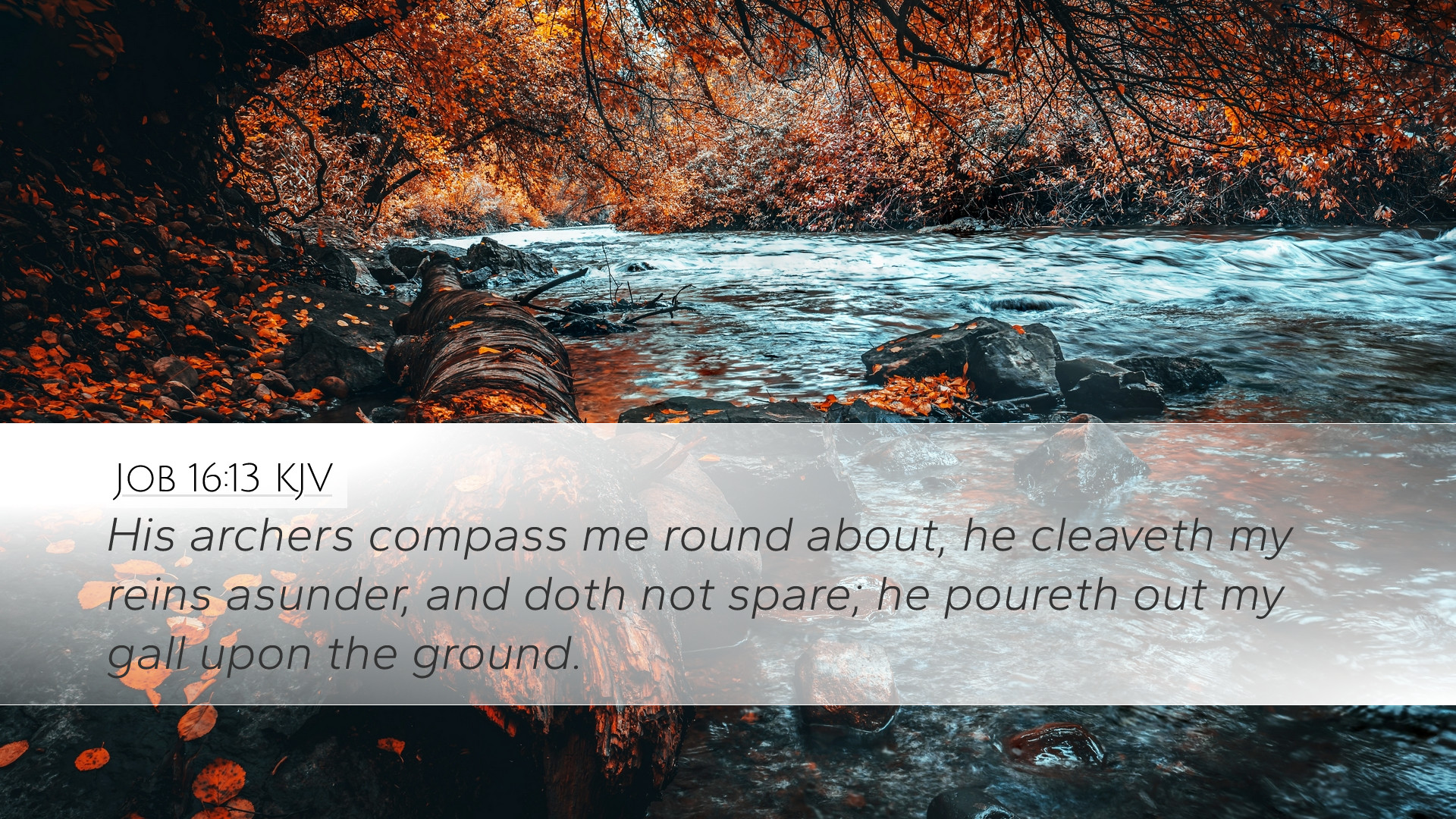Old Testament
Genesis Exodus Leviticus Numbers Deuteronomy Joshua Judges Ruth 1 Samuel 2 Samuel 1 Kings 2 Kings 1 Chronicles 2 Chronicles Ezra Nehemiah Esther Job Psalms Proverbs Ecclesiastes Song of Solomon Isaiah Jeremiah Lamentations Ezekiel Daniel Hosea Joel Amos Obadiah Jonah Micah Nahum Habakkuk Zephaniah Haggai Zechariah MalachiJob 16:13
Job 16:13 KJV
His archers compass me round about, he cleaveth my reins asunder, and doth not spare; he poureth out my gall upon the ground.
Job 16:13 Bible Commentary
Commentary on Job 16:13
The verse Job 16:13 reads:
"His archers compass me round about, he cleaveth my reins asunder, and doth not spare; he poureth out my gall upon the ground."
Contextual Overview
This passage is part of Job's response to his friends in the midst of his profound suffering. Throughout the Book of Job, the themes of suffering, divine justice, and human understanding of God's will are intricately explored.
Commentary Insights
1. The Metaphor of Archers
Job uses the imagery of archers to describe his affliction. He feels surrounded by enemies, suggesting a loss of hope and support. According to Matthew Henry, this metaphor highlights not just physical pain, but the emotional torment Job experiences as he feels besieged by suffering: "He speaks of God's actions as relentless; like skilled archers, they strike him from all sides."
2. The Cleaving of Reins
The term "cleaveth my reins asunder" can be understood both literally and figuratively. Albert Barnes elaborates that the "reins" refer to the innermost parts of a person — the heart and emotions. Job describes the depth of his agony: "The divine arrows that pierce him do not only hurt the flesh but also shred apart his very spirit."
3. The Idea of Divine Judgment
In this context, Job wrestles with the concept of divine judgment. He questions why he, a man of integrity, suffers while the known wicked appear to prosper. Adam Clarke reflects, "Job’s lament is not merely a reflection of despair; it showcases an acute awareness of justice and equity in the universe." He sees God as bearing down on him, not with favor but with judgment, reinforcing Job's feeling of abandonment.
4. The Gall and Its Symbolism
Job states, "he poureth out my gall upon the ground." Here, gall symbolizes bitterness and anguish. Matthew Henry points out that Job feels as if his very essence is being poured out in sorrow: "This imagery speaks of the anguish that is so intense it cannot be contained; it must be spilled forth."
5. The Suffering of the Innocent
Job's honest expression of his suffering raises profound theological questions about the suffering of the innocent. Albert Barnes suggests that this passage serves as an early, poignant inquiry into the nature of suffering and the human condition: "Job's cry represents humanity's quest for understanding in the face of unfathomable pain."
Theological Implications
This verse, much like the rest of the Book of Job, is rich in theological implications. It speaks to the ways in which individuals seek to understand their suffering in light of God's nature. The struggles of Job resonate with countless believers who experience inexplicable adversity.
1. The Nature of God
This passage compels readers to confront their understanding of God in the midst of suffering. Is God distant or present in our pain? Adam Clarke emphasizes the need to reconcile such feelings of abandonment with the truth of God’s sovereignty and goodness.
2. The Human Condition
Job's lament can be seen as a universal cry reflecting the human search for meaning in suffering. This speaks to the human condition’s vulnerability and the profound desire for empathy and understanding during dark times.
Conclusion
Job 16:13 stands as a poignant reminder of the emotional depth found within the scriptures. It invites pastors, students, theologians, and scholars to engage deeply with the complexities of human suffering and divine interaction. It challenges us to explore our own understandings of God, especially in moments of agony and confusion.


